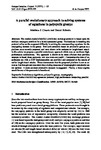A parallel evolutionary approach to solving systems of equations in polycyclic groups
| dc.contributor.author | Craven, Matthew | |
| dc.contributor.author | Robertz, Daniel | |
| dc.date.accessioned | 2016-10-12T15:48:13Z | |
| dc.date.issued | 2016-11-01 | |
| dc.identifier.issn | 1867-1144 | |
| dc.identifier.issn | 1869-6104 | |
| dc.identifier.other | 0 | |
| dc.identifier.uri | http://hdl.handle.net/10026.1/6507 | |
| dc.description.abstract |
<jats:title>Abstract</jats:title><jats:p>The Anshel–Anshel–Goldfeld (AAG) key exchange protocol is based upon the multiple conjugacy problem for a finitely-presented group. The hardness in breaking this protocol relies on the supposed difficulty in solving the corresponding equations for the conjugating element in the group. Two such protocols based on polycyclic groups as a platform were recently proposed and were shown to be resistant to length-based attack. In this article we propose a parallel evolutionary approach which runs on multicore high-performance architectures. The approach is shown to be more efficient than previous attempts to break these protocols, and also more successful. Comprehensive data of experiments run with a GAP implementation are provided and compared to the results of earlier length-based attacks. These demonstrate that the proposed platform is not as secure as first thought and also show that existing measures of cryptographic complexity are not optimal. A more accurate alternative measure is suggested. Finally, a linear algebra attack for one of the protocols is introduced.</jats:p> | |
| dc.format.extent | 109-125 | |
| dc.language.iso | en | |
| dc.publisher | Walter de Gruyter GmbH | |
| dc.title | A parallel evolutionary approach to solving systems of equations in polycyclic groups | |
| dc.type | journal-article | |
| dc.type | Journal Article | |
| plymouth.issue | 2 | |
| plymouth.volume | 8 | |
| plymouth.publication-status | Published | |
| plymouth.journal | Groups Complexity Cryptology | |
| dc.identifier.doi | 10.1515/gcc-2016-0012 | |
| plymouth.organisational-group | /Plymouth | |
| plymouth.organisational-group | /Plymouth/Faculty of Science and Engineering | |
| plymouth.organisational-group | /Plymouth/Faculty of Science and Engineering/School of Engineering, Computing and Mathematics | |
| plymouth.organisational-group | /Plymouth/REF 2021 Researchers by UoA | |
| plymouth.organisational-group | /Plymouth/REF 2021 Researchers by UoA/EXTENDED UoA 10 - Mathematical Sciences | |
| plymouth.organisational-group | /Plymouth/REF 2021 Researchers by UoA/UoA10 Mathematical Sciences | |
| plymouth.organisational-group | /Plymouth/Users by role | |
| plymouth.organisational-group | /Plymouth/Users by role/Academics | |
| dcterms.dateAccepted | 2016-07-01 | |
| dc.rights.embargodate | 2017-10-11 | |
| dc.identifier.eissn | 1869-6104 | |
| dc.rights.embargoperiod | Not known | |
| rioxxterms.versionofrecord | 10.1515/gcc-2016-0012 | |
| rioxxterms.licenseref.uri | http://www.rioxx.net/licenses/all-rights-reserved | |
| rioxxterms.licenseref.startdate | 2016-11-01 | |
| rioxxterms.type | Journal Article/Review |


